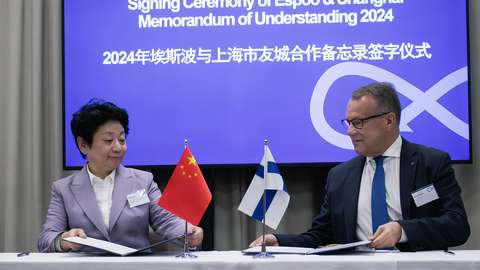Sustainable development work connects Espoo and Shanghai

Espoo and Shanghai signed a new cooperation agreement on 14 October 2024 as part of a sustainable development forum held in Hanasaari. The current cooperation focuses on promoting the UN’s Sustainable Development Goals.
Cooperation with the Chinese city did not develop overnight. The first sister city agreement between Espoo and Shanghai was signed in 1998. In the current cooperation, the focal points include, in addition to sustainable development and climate work, different themes of teaching.
"The UN’s Sustainable Development Agenda guides the cooperation between Espoo and Shanghai. The agenda’s goals are an excellent tool for promoting sustainable development and dialogue between countries and actors. We need local, national and international cooperation to succeed,” Mayor Jukka Mäkelä said at the forum.
Two green cities working together
In Espoo, we are used to always having nature nearby. Shanghai’s cityscape is also green, even though it is a city of 24 million residents. Shanghai is the fifth most significant economy in the world.
Shanghai is committed to improving people’s quality of life through sustainable city planning and environmental goals, especially in the context of developing a child-friendly city. The forum also highlighted Shanghai’s “15-minute city” goal, where everyday services are local. In Espoo, we too strive for a smooth everyday life when developing our five urban centres.
In Espoo, sustainable development is integrated into all school subjects and school work, from early childhood education to upper secondary school. Espoo is an active member of the UNESCO Global Network of Learning Cities. This global collaboration, led by Shanghai and Hamburg, enables the sharing of best practices and the development of new innovative solutions to the challenges of sustainable development.
Low carbon plays major role
In both Espoo and Shanghai, climate work is part of a more comprehensive package to achieve the UN’s Sustainable Development Goals (SDGs).
In Espoo, we are committed to being a pioneer in the UN Agenda 2030 work and reporting on it in 2025. China is also shifting to a low-carbon economy. The country’s goal is to curb peak emissions by 2030 and achieve carbon neutrality by 2060.
Espoo aims to achieve carbon neutrality sooner, by 2030. We want to reduce the region’s emissions by 80 per cent from the 1990 level by 2030. The remaining 20 per cent can be absorbed into carbon sinks or offset by other means. The Carbon-neutral Espoo 2030 roadmap, approved in May 2024, shows that achieving this carbon neutrality goal is possible. Provided that we work together.
Shanghai is one of the largest and fastest developing cities in the world, but it has also become a major player in the field of sustainable development. Shanghai’s investments in public transport infrastructure, green energy and circular economy make it a role model for many other metropolises.
“Climate change is a challenge that unites all of humanity, as solutions for it must be developed through cooperation. Shanghai is a valuable partner for Espoo; we share our best practices and work towards common goals. An important role in Espoo’s climate work is played by handprint thinking, which means that the solutions developed by us can play a major role in reducing greenhouse gas emissions globally,” says Milla Ovaska, Head of International Affairs at the City of Espoo.
Inquiries
Milla Ovaska, Head of International Affairs, City of Espoo, tel. +358 43 8244911, milla.ovaska@espoo.fi